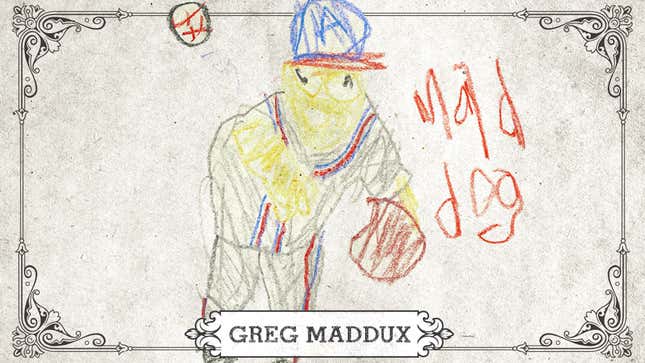
Having purchased a Hall of Fame ballot, which we filled out in accordance with the wishes of our readers, we're reviewing the merits—and relative lack of merits—of all 36 players on this year's ballot. All entries in the series can be found here.
My first exposure to baseball was a game between the Atlanta Braves and the Montreal Expos, in which Rick Mahler and his facial hair threw a complete game, giving up one run. My mother was in the hospital, recovering from labor, chatting to the swaddled baby in her arms about the various Atlanta players as they appeared on the screen. I was maybe three hours old.
Ten years later, I had ancillary appreciation for the game, but little else. It wasn't that I didn't enjoy baseball; the problem was that I just didn't know how to go about the project of doing so. That all changed in the summer of 1995, when I came to baseball like an incubator-hatched gosling and imprinted directly on the Professor.
In a matter of weeks, I became a fifth grader with a deep and abiding love for the art of the pitchers' duel.
In hindsight, this seems kind of absurd. Most kids gravitate to players who create spectacle, the exciting ones who snatch home runs from the air and then belt them out themselves—charismatic Ken Griffey, Jr. types. Not me. While my sister ardently cheered on a baby-faced Chipper Jones, I reserved my baseball reverence for Greg Maddux.
To hear my mother say it, "Well, yeah, that was a little weird."
It was all my grandfather's fault. My Papa, a once-professional pitcher who abandoned the game after the war because he couldn't stand to be away from his family, had gotten me hooked on baseball. I have a vague memory of plopping down next to him and, per my usual, unleashing a barrage of questions. And, in what can only be described as the ultimate display of patience and love, he began systematically answering my questions about baseball.
As it turns out, I had a lot of questions about baseball.
Watching baseball with him was great because he had opinions on everyone and everything. He'd read the batter, talk about their stance, their swing, their demeanor. He'd dissect the pitcher, issuing grunt of approval for a good pitch. He was simultaneously enthusiastic and frustrated and joyful, completely absorbed in the minutiae of the game. I'd never seen baseball the way I saw it through his eyes. I'd watched teams play each other, but I'd never seen what was going on, not really, not where the game actually happens. I never knew about the eternal battle being waged day in and day out, all summer long.
But Papa saw the duel. He saw baseball as a match of wits that required discipline and rarified technical prowess. The intensity with which he would turn on a floundering closer was magnificent. It didn't matter how great a pitcher was, the speed with which their fastball flew across the plate, how mean their curve was on a good day: if they couldn't throw it reliably, he would never really like them. Oh, sure, when they were on a hot streak, he'd love 'em. But unreliable wunderkind types were warily regarded. Control was king.
It should come as no surprise, then, that my Papa loved Greg Maddux.
He always called him the Professor. And when the Professor was pitching, I knew I was going to get a glorious lesson. In other games, the sins of the pitcher were a constant source of irritation. Papa believed that good pitching meant never getting behind in the count, never walking anybody, never losing control, and, for the love of God, never, ever walking the leadoff hitter. But when Maddux was on the mound, my grandfather glowed.
The economy of his work, throwing perfectly disruptive pitches to create a maddening string of ground-outs to first. That legendary control. The way he took something as absurd and surreal as baseball and distilled it, so that it was as pure and simple as plain water. Through Maddux, my Papa taught me the psychology of the game: how to see the dominance of a pitcher who can read men at the plate better than their own mothers, or appreciate the sonic success of a hitter who guessed what was coming. As he had it, it was all very Warren Spahn, hitting as timing and good pitching as all about disrupting that timing.
Maddux never threw particularly hard, and his curveball didn't dazzle, but everyone knows that never really mattered. His accuracy, his control, was astounding; when combined with his ability to keep the hitter off-balance, he was searingly efficient. The economy of his pitching style, his ability to remember specific at-bats from years past, the simplicity with which played, one damn pitch at a time: it all added up to something rare. In the truest sense of the word, Greg Maddux was great.
By teaching me to understand the way Maddux pitched, my grandfather taught me how to watch baseball. By showing me how to appreciate such greatness in a player, Papa taught me how to love the game.
On Opening Day of the 2002 season, my Papa died. The previous year, the Professor set a National League record by going 72 and ½ innings without giving up a single walk.
And when it comes to the Hall of Fame, I'd argue that giving such a send-off to a man who hated walks as much as my Papa did more than covers the price of admission.
Leigh Cowart is a freelance journalist covering sports, science, and sex. Her work has appeared in Vice, The Classical, and NSFWCORP, among other places. Follow her on Twitter @voraciousbrain. Not for the faint of heart.
Art by Sam Woolley